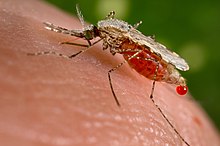
In epidemiology, a disease vector is any living[1] agent that carries and transmits an infectious pathogen such as a parasite or microbe, to another living organism.[2][3] Agents regarded as vectors are mostly blood-sucking insects such as mosquitoes. The first major discovery of a disease vector came from Ronald Ross in 1897, who discovered the malaria pathogen when he dissected the stomach tissue of a mosquito.[4]
- ^ "Vector-borne diseases".
- ^ "Vector". WordNet Search 3.1. Princeton University. Retrieved 7 April 2014.
- ^ Last, James, ed. (2001). A Dictionary of Epidemiology. New York: Oxford University Press. p. 185. ISBN 978-0-19-514169-6. OCLC 207797812.
- ^ Prevention, CDC-Centers for Disease Control and (2017-03-28). "CDC - Malaria - About Malaria - History - Ross and the Discovery that Mosquitoes Transmit Malaria Parasites". www.cdc.gov. Retrieved 2020-10-23.